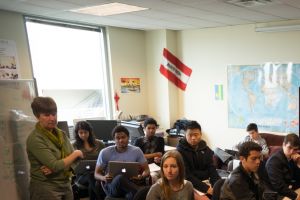Over the past year, we have collaborated with researchers at Morehouse School of Medicine and students recruited from several universities and community-based organizations in Georgia to form a network of young adult Peer Champions to promote COVID-19 vaccination in their communities, with a focus on Black and Latinx Georgians. Recognizing the outsized role of social media in driving health misinformation on the one hand and serving as a means of outreach on the other, we developed a social media dashboard as an early exploration of what kind of social media-based tools could support our Peer Champions and other community-based trusted messengers. To better understand the nature of their work and opportunities for digital tools, we conducted interviews with 11 Peer Champions, performing think-aloud tasks with our dashboard and prototypes of prospective features while discussing how they might fit in with their work. We found that the Peer Champions often saw themselves as being in-between mainstream public health research and their community members, especially more vaccine hesitant people. Thus, their work can be understood as translating between these parties: listening to community concerns, learning up-to-date COVID-19 information, and synthesizing these knowledges to conduct outreach in a way which is engaging and effective. Challenges include not having full knowledge of what (mis)information vaccine hesitant community members are influenced by, being overwhelmed by constant COVID-19 developments, and uncertainty in information sources; they faced these issues particularly when trying to use general search engines and social media platforms for their work. Dedicated social media monitoring and outreach tools could help them gather latest COVID-19 developments and conversations, and identify relevant trustworthy information and resources to share.

The Technologies and International Development Lab at Georgia Tech researches the practice, the promise, and the peril of information and communication technologies (ICTs) in social, economic, and political development. We study the risks and rewards of ICT systems for people and communities particularly within Africa and Asia. We explore issues of rights and justice in a digital age. And we examine new forms for inclusive innovation and social entrepreneurship enhanced through digital systems.
The T+ID Lab is an interdisciplinary community bringing together computer and social scientists with design and policy specialists. We collaborate directly with stakeholders outside of the Lab to critique technologies, invent new ones, and research how and why (or why not) ICTs can serve as a tool to empower, enrich, and interconnect.


